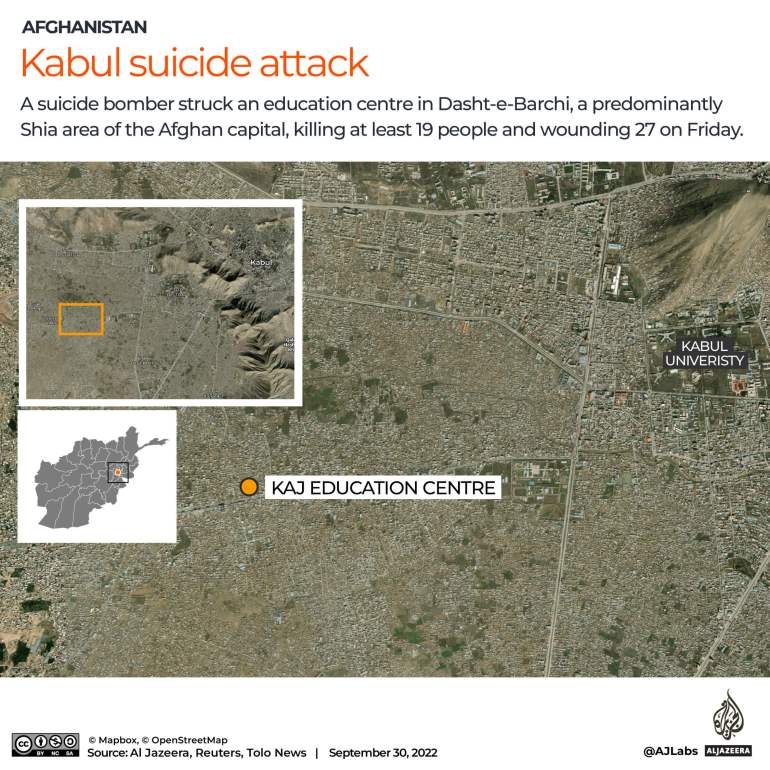Al Jazeera
Published On 30 Sep 2022
At least 27 others have been wounded in the explosion at the Kabul education centre in the Dasht-e-Barchi neighbourhood.
A suicide bomber has attacked an educational institute in the Afghan capital, killing at least 19 people.
As many as 27 others were wounded in the blast early on Friday, which occurred in the Dasht-e-Barchi neighbourhood of western Kabul, a predominantly Shia Muslim area home to the minority Hazara community, according to police spokesman Khalid Zadran.
Videos posted online and photos published by local media showed bloodied victims being carried away from the scene.
The victims included high school graduates, both girls and boys, who were taking a practice university entrance exam at the Kaj education centre when the blast went off, Zadran said. Schools are typically closed in Afghanistan on Fridays.
“Attacking civilian targets proves the enemy’s inhuman cruelty and lack of moral standards,” he said, without specifying who was believed to be behind the attack.
One wounded student said the victims were mostly girls.
“We were around 600 (students) in the classroom, but most of the casualties are among girls,” the male student told the AFP news agency from the hospital where he was being treated.
No group immediately claimed responsibility.

Families rushed to area hospitals where ambulances were arriving with victims and lists of those confirmed dead and wounded were posted to the walls.
“We didn’t find her here,” said a distressed woman looking for her sister at one of the hospitals. “She was 19 years old.”
Resident Ghulm Sadiq said he was at home when he heard a loud sound. He went outside to see smoke rising from the education centre where he and neighbours rushed to help.
“My friends and I were able to move around 15 wounded and nine dead bodies from the explosion site … Other bodies were lying under chairs and tables inside the classroom,” he said.
Further details of the attack were not immediately available, although the official death toll was expected to rise.
Ethnic Hazara have alleged years of persecution by the ruling Taliban, which returned to power in the country following the withdrawal of United States-led forces in August 2021, and have been the victims of several attacks claimed by the rival ISIL (ISIS) group.
The Dasht-e-Barchi neighbourhood has witnessed some of the worst attacks in Afghanistan in recent years.
In 2021, before the Taliban takeover, at least 85 people – mostly female students – were killed and about 300 others wounded when three bombs exploded near their school in Dasht-e-Barchi.
No group claimed responsibility for that attack, but a year earlier, ISIL claimed responsibility for a suicide attack on an educational centre in the same area that killed 24, including students.
In April of this year, two deadly bomb blasts at separate education centres in the area killed six people and wounded 20 others.
‘Shamefaced reminder’
Since taking control, the Taliban government has emphasised that it is securing the nation following decades of war, but a series of attacks on mosques and civilian areas in recent months has challenged that narrative.
In the wake of the attacks, Samira Hamidi, Amnesty International’s South Asia campaigner, decried the killings as a “shamefaced reminder of the inaptitude and utter failure of the Taliban, as de-facto authorities, to protect the people of Afghanistan”.
“Since their takeover of Afghanistan, the Taliban have done little to put in place any measures for the protection of the public, especially of Shia-Hazaras who have been systematically targeted largely by the Islamic State (IS) in schools, mosques, training centers and public places,” she said in a statement.
“Instead, their actions of omission and commission have only further aggravated the risk to the lives of the people of Afghanistan especially those belonging to ethnic and minority communities.”
Education also remains a flashpoint issue in Afghanistan with the Taliban blocking many girls from returning to secondary education.
On Friday, Neil Turner, the Norwegian Refugee Council’s Country Director in Afghanistan, called on authorities “to take steps to ensure that educational facilities are protected against threats and attacks so that girls and boys can fully enjoy their education rights”.
SOURCE: NEWS AGENCIES
 Afghanistan Peace Campaign
Afghanistan Peace Campaign